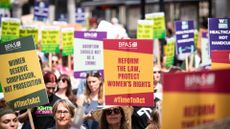The end of home abortions
‘Pill by post’ legislation had been introduced in March 2020 in response to pandemic

The government is scrapping home abortions this autumn, ending the temporary legislation introduced as a result of the coronavirus pandemic. The law change had enabled women in their first ten weeks of pregnancy to carry out an abortion at home without having to physically attend a hospital or clinic.
Since March 2020, women have been able to secure two abortion pills through the post after undergoing a video or telephone consultation with a clinician. Previously only misoprostol, the second of the two pills needed for an early abortion, was permitted to be taken at home.
The “pill by post” legislation was introduced by former health secretary Matt Hancock under the 1967 Abortion Act in response to Covid-19, with the Department of Health and Social Care describing it as a “temporary” measure.
Subscribe to The Week
Escape your echo chamber. Get the facts behind the news, plus analysis from multiple perspectives.

Sign up for The Week's Free Newsletters
From our morning news briefing to a weekly Good News Newsletter, get the best of The Week delivered directly to your inbox.
From our morning news briefing to a weekly Good News Newsletter, get the best of The Week delivered directly to your inbox.
Data from the Department of Health showed that 43% of medical abortions in the UK were administered at home between April and June 2020.
Move ‘empowered’ women
The government’s March 2020 legalisation of home abortion was welcomed by several clinicians and women’s groups, with the British Pregnancy Advisory Service (BPAS) describing it as “the silver lining of the pandemic”.
Vivienne Rose, clinic manager at the BPAS clinic in Cardiff, said the legislation had “empowered” women. She told the BBC that the provision of “telemedical abortion care” had led to a reduction in waiting times, meaning abortions were being carried out at an earlier gestational stage.
According to NHS guidance, “abortions are safest, and happen with less pain and bleeding, when carried out as early as possible in pregnancy”.
Kerry Abel, the chair of Abortion Rights UK, told The Guardian that the legislation had broken down some of the barriers women face when accessing abortion services in this country. “More than 50% of women who have an abortion have children already,” she said. “Telemedicine avoids paying out for childcare and even missing potential work if someone has to give up a shift and they have a zero-hours contract.”
Religious opposition
Religious groups expressed opposition to the temporary legislation, citing concerns about a lack of safeguarding or on-hand doctors and nurses in the case of something going wrong. In September 2021, The Mail on Sunday reported that three out of five ambulance services that responded to Freedom of Information requests had recorded “sizeable increases in abortion-pill-related calls or responses since April 2020”.
In London, the number of ambulance dispatches related to abortion pills doubled from about seven to 14 a month after the “pills by post” system was introduced.
Andrea Williams, chief executive of the advocacy group Christian Concern, described the increase in 999 calls as “highly concerning, but sadly unsurprising”. “Women deserve better than to be left in such a vulnerable situation without proper care or medical supervision,” she told the paper.
Legislation ending in autumn
The legislation is now set to expire at the end of this month, but ministers are providing a six-month extension which will end in autumn, The Daily Telegraph reported today.
The temporary extension has been allowed “amid concern that abortion clinics would be unable to cope with demand if asked to suddenly return to old ways of working”, said the paper.
The Royal College of Obstetricians and Gynaecologists, the Royal College of Midwives and the British Medical Association have made an urgent plea to the prime minister to retain the current system, saying that revoking home abortion “would indicate a deep distrust of women and an institutional disregard for their reproductive rights”.
A letter written by the leading reproductive healthcare providers in England and Wales earlier this year claimed that stopping the legislation would “cause a significant strain to healthcare providers and the NHS, increase waiting times, and increase the numbers of women having to undergo surgical procedures at later gestations”.
But a Whitehall source told The Times that it felt “right” to make a “safe return to the policy that was in place pre-pandemic”.
Create an account with the same email registered to your subscription to unlock access.
Sign up for Today's Best Articles in your inbox
A free daily email with the biggest news stories of the day – and the best features from TheWeek.com
Kate Samuelson is the newsletter editor, global. She is also a regular guest on award-winning podcast The Week Unwrapped, where she often brings stories with a women’s rights angle. Kate’s career as a journalist began on the MailOnline graduate training scheme, which involved stints as a reporter at the South West News Service’s office in Cambridge and the Liverpool Echo. She moved from MailOnline to Time magazine’s satellite office in London, where she covered current affairs and culture for both the print mag and website. Before joining The Week, Kate worked as the senior stories and content gathering specialist at the global women’s charity ActionAid UK, where she led the planning and delivery of all content gathering trips, from Bangladesh to Brazil. She is passionate about women’s rights and using her skills as a journalist to highlight underrepresented communities.
Alongside her staff roles, Kate has written for various magazines and newspapers including Stylist, Metro.co.uk, The Guardian and the i news site. She is also the founder and editor of Cheapskate London, an award-winning weekly newsletter that curates the best free events with the aim of making the capital more accessible.
-
 Covid four years on: have we got over the pandemic?
Covid four years on: have we got over the pandemic?Today's Big Question Brits suffering from both lockdown nostalgia and collective trauma that refuses to go away
By Chas Newkey-Burden, The Week UK Published
-
 The hollow classroom
The hollow classroomOpinion Remote school let kids down. It will take much more than extra tutoring for kids to recover.
By Mark Gimein Published
-
 OTC birth control arrives amid the battle over reproductive rights
OTC birth control arrives amid the battle over reproductive rightsTalking Points Opill will cost $19.99 a month. Democrats are pushing to make it cheaper.
By Joel Mathis, The Week US Published
-
 The race to develop male birth control
The race to develop male birth controlThe Explainer New contraception is being conceived
By Devika Rao, The Week US Published
-
 The rise in illegal pregnancy termination investigations
The rise in illegal pregnancy termination investigationsUnder the Radar 'Unprecedented' number of women being prosecuted prompts medical body to tell members not to report suspected cases to police
By The Week UK Published
-
 Excess screen time is making children only see what is in front of them
Excess screen time is making children only see what is in front of themUnder the radar The future is looking blurry. And very nearsighted.
By Devika Rao, The Week US Published
-
 Covid-19: what to know about UK's new Juno and Pirola variants
Covid-19: what to know about UK's new Juno and Pirola variantsin depth Rapidly spreading new JN.1 strain is 'yet another reminder that the pandemic is far from over'
By Arion McNicoll, The Week UK Published
-
 Long-term respiratory illness is here to stay
Long-term respiratory illness is here to stayThe Explainer Covid is not the only disease with a long version
By Devika Rao, The Week US Published

